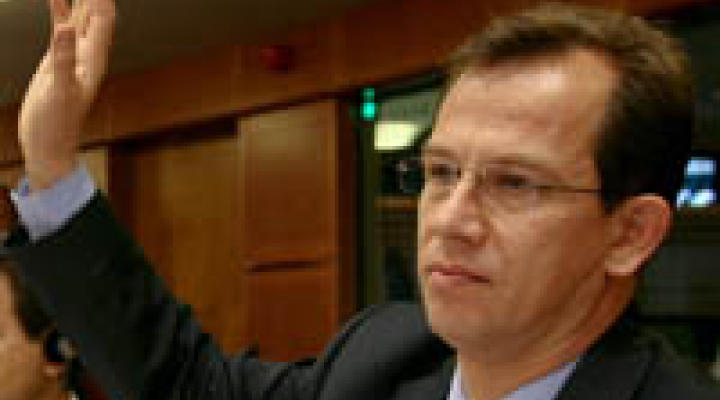Broadcasting rights should be granted by language, not by state
The Intergroup for Traditional Minorities, National Communities and
Languages of the European Parliament held its monthly meeting at the
plenary sitting of the EP on July 8. The agenda included the report of
Rundfunk- Anstalt Südtirol (RAS) public radio and television agency for
the autonomous Province of Bozen.
The Intergroup for Traditional Minorities, National Communities and Languages of the European Parliament held its monthly meeting at the plenary sitting of the EP on July 8. The agenda included the report of Rundfunk- Anstalt Südtirol (RAS) public radio and television agency for the autonomous Province of Bozen.
The agency’s report and the issues of broadcasting in a minority language came to be on the agenda due to the fact that members of national minorities all over the EU did not have full access to the broadcasted games of the football World Cup.
RAS president Rudolf Gamper presented the achievements of his organization that has 26 employees and has been broadcasting for 35 year with impressive ratings. In his experience, state funding led to the development of such a positive cross-border cooperation that is an important part of Europe’s cultural capital. Yet he still called for the review of the EU broadcasting directives. MEPs shared Gampers’ opinion, saying that broadcasting rights should be awarded by language, not by state. This would enable communities in minority status to enjoy the broadcasting rights purchased by a state. In other words, the rights should be awarded not to the state, but the community speaking one particular language or another.
DAHR’s MEP Csaba Sógor also took part in the debate. In his remarks, he supported RAS’ initiative and presented the situation in Transylvania, Romania, where members of the Hungarian community were also facing the restrictions of these rights.
François Alphonsi (Greens/EFA) represents the Corsican minority in the Intergroup. He presented a motion for a resolution and asked his colleagues to to support the resolution and thus to make it an official standpoint of the EP. The document detailed the protection of endangered languages in the EU. The document will most probably be finalized during this fall with the involvement of Vivane Reding, Commissioner for Justice, Fundamental Rights and Citizenship and Androulla Vassiliou, Commissioner for Education, Culture, Multilingualism and Youth. Being a former commissioner and having taken part in the development of EU programmes aiding national minorities and usage on minority languages, Mrs. Reding is familiar with the question at hand. On her part, Mrs. Vassiliu has ensured communities speaking less widespread languages of her support even at the occasion of her official hearings.
The agency’s report and the issues of broadcasting in a minority language came to be on the agenda due to the fact that members of national minorities all over the EU did not have full access to the broadcasted games of the football World Cup.
RAS president Rudolf Gamper presented the achievements of his organization that has 26 employees and has been broadcasting for 35 year with impressive ratings. In his experience, state funding led to the development of such a positive cross-border cooperation that is an important part of Europe’s cultural capital. Yet he still called for the review of the EU broadcasting directives. MEPs shared Gampers’ opinion, saying that broadcasting rights should be awarded by language, not by state. This would enable communities in minority status to enjoy the broadcasting rights purchased by a state. In other words, the rights should be awarded not to the state, but the community speaking one particular language or another.
DAHR’s MEP Csaba Sógor also took part in the debate. In his remarks, he supported RAS’ initiative and presented the situation in Transylvania, Romania, where members of the Hungarian community were also facing the restrictions of these rights.
François Alphonsi (Greens/EFA) represents the Corsican minority in the Intergroup. He presented a motion for a resolution and asked his colleagues to to support the resolution and thus to make it an official standpoint of the EP. The document detailed the protection of endangered languages in the EU. The document will most probably be finalized during this fall with the involvement of Vivane Reding, Commissioner for Justice, Fundamental Rights and Citizenship and Androulla Vassiliou, Commissioner for Education, Culture, Multilingualism and Youth. Being a former commissioner and having taken part in the development of EU programmes aiding national minorities and usage on minority languages, Mrs. Reding is familiar with the question at hand. On her part, Mrs. Vassiliu has ensured communities speaking less widespread languages of her support even at the occasion of her official hearings.











